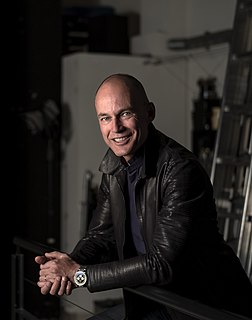A Quote by Bertrand Piccard
The pioneering spirit is less about thinking up new ideas, as ridding ourselves of dogmas and habits that hold us captive in thinking.
Related Quotes
Pride is the switch that turns off priesthood power. Humility is a switch that turns it on . . . . Some suppose that humility is about beating ourselves up. Humility does not mean convincing ourselves that we are worthless, meaningless, or of little value. Nor does it mean denying or withholding the talents God has given us. We don't discover humility by thinking less of ourselves; we discover humility by thinking less about ourselves. It comes as we go about our work with an attitude of serving God and our fellowman.
When we are not engaged in thinking about some definite problem, we usually spend about 95 percent of our time thinking about ourselves. Now, if we stop thinking about ourselves for a while and begin to think of the other person's good points, we won't have to resort to flattery so cheap and false that it can be spotted almost before it is out of the mouth.
In order to have a hope of creating better answers, we need to deeply understand the logic of the opposing answers. That means thinking about how we think about both models - not just do we like one versus the other. Rather we have to ask: How do I think each model produces the results that it does? Metacognition, thinking about thinking, builds up our capacity to do that and to play with opposing ideas - and new models - in real time.
When I'm playing music I'm usually not thinking of surfing, just because I'm usually thinking about the chords and the lyrics, and sometimes that messes me up 'cause you'll start thinking, "Wait, how am I doing this?" But when I'm surfing, I'm usually thinking about music - whether it's an idea for a new song, or just singing a song in my head.
Awareness is not the same as thought. It lies beyond thinking, although it makes no use of thinking, honoring it's value and it's power. Awareness is more like a vessel which can hold and contain our thinking, helping us to see and know our thought as thought rather than getting caught up in them as reality.





































